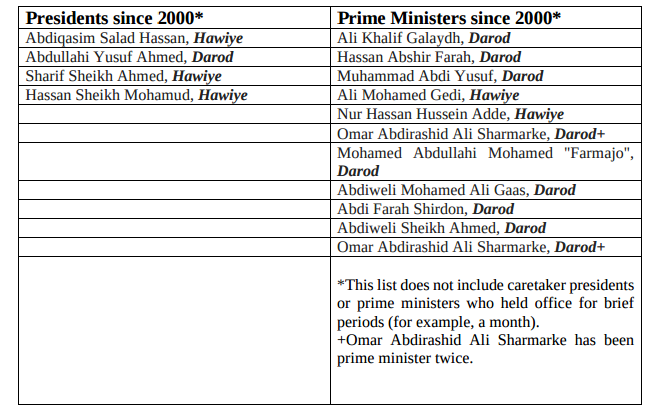22 January 2016 – We are finally in 2016. Just like the years 2000, 2004, 2009 and 2012, Somalia’s parliament is due to elect a president. After dismissing a general election for security and political reasons, its politicians have been having an intense debate on the nature of this year’s election method to parliament.
On one side, there are those who advocate for the retention of the much-derided 4.5 clan system. On the other side, some politicians support a district-based selection system.
Both sides have put forward convincing reasons for the two opposing methods. However, there has been one issue that has been conspicuously missing from the debates, namely the rotation convention. Since 2000, when the Arta conference adopted the 4.5 power-sharing system, Somalia’s two highest political offices, president and prime minister, have been held by only two Somali clans.
The table below shows that out of the thirteen individuals who have held these posts*, all have come from either the Darod or Hawiye clans. The remaining 2.5 (Dir, Digil and Mirifle and minority clans) have been excluded by the rotation convention.
This convention stipulates that a Darod or Hawiye president must select a Darod or Hawiye prime minister. In theory, these is no Act of Parliament or constitutional clause that excludes others from seeking the office of president, however this convention is so widely accepted that it has, in effect, become a constitutional convention. In the four presidential elections since 2000, Somalia’s parliament has followed this convention every single time and elected a Darod or Hawiye as president. In turn, each president has always selected a Darod or Hawiye as prime minister.

This is damaging to Somalia in the long-term. Rather than bringing together a country that has been in civil war for the past 26 years, this convention is further dividing Somalis. It makes genuine reconciliation more difficult and it hampers the aspirations of a large section of Somalia’s youth.
Instead of promoting inclusive and nationalistic politics, the 4.5 system has institutionalised clan politics which has affected every layer of government and administration. It has directly led to the adoption of the rotation convention. This has upset and alienated a large section of the Somali population.
Take the profile of a Benadiri man** living in Canada, USA or the UK. He fled his country in the early 1990s after witnessing family members killed, raped or maimed and his property occupied. He moved abroad, started a new life but still dreams of his homeland. Instead of being welcomed back home, he was told, in the year 2000, that he was to be recognised as a .5 (point 5)*** . Moreover, the rotation convention means that he most likely can never hold the highest offices in his home country.
What sort of message is this sending to these communities and their children? Members of this clan are being treated like they are second class citizens of their homeland. These are people who played prominent roles in the independence struggle; six out of thirteen of the founding members of the Somali Youth League, Somalia’s independence movement, belonged to the Benadiri clan. Instead of redress and an apology for the atrocities they faced, they continue to face discrimination.
Let us take another profile. A man who lived in Hargeisa, Somaliland^ in 1988 who witnessed the destruction of his city and lost loved ones. Rather than receive compensation and recognition of the genocide he endured, this young man instead faces even more injustice. Since 2000, when 4.5 became institutionalised, a member of the Isaaq clan has not been president or prime minister. Consequently, this convention ignores the historical atrocities suffered by Somalilanders and has the effect of driving them away even further.
Are we really comfortable with a convention that denies children in Hargeisa from aspiring to hold the highest offices in Somalia? Examples like these are common. Take also the case of a child who hails from Baidoa. The above convention means that the highest office that he can ever aspire to is Speaker of Parliament, which is reserved for members of the Digil and Mirifle clan. This child from Baidoa could be a great president like Aden Abdulle or George Washington. But because identity-politics is institutionalised, we will never know. This is unfortunate.
Somalia’s neighbour Kenya understands this to some extent. Kenya’s current Secretary for Foreign Affairs, Amina Mohamed, is an ethnic Somali. Its previous Minister of Defence, Mohamed Yusuf Haji, is also an ethnic Somali. This should inspire Somalia’s political elite to change course.
As it currently stands, the rotation convention is denying a large section of Somalia’s population from feeling like they truly belong. When ambitions and opportunities are systematically denied, a country can never really progress. Identity politics should be rejected. Somalia’s policymakers should promote a political system based on meritocracy so that every Somali can get a fair chance. This convention should be annulled.
This op-ed was written by Ali Abdi Ali.
* – One of them, Omar Abdirashid Ali Sharmarke, has held the post of prime minister twice.
** – The Benadiri are considered to be a minority clan.
*** – Meaning that he can only aspire to get half of the political posts that “major” clans get
^ – Self-declared autonomous state
